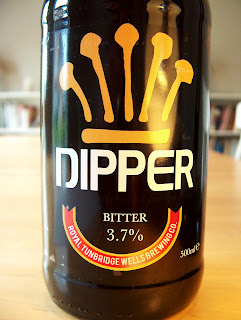Today's Beer
Name – Dipper
Brewer – Royal Tunbridge Wells
Classification – Bitter
Strength – 3.7% ABV
Verdict - At A Glance
On the eye – Lustrous chestnut. (What could be observed from what little of the beer was salvaged... read on!)
On the nose – Vivid spices and rich citrus. Intensely fresh-feeling.
On the tongue – Dry, sharply bitter, and packed with spiced fruit. Lovely.
On the subject – One of the newest (or perhaps 'freshest' suits them better) breweries around, these guys are brewing beer like they've done it for decades. These bottled versions are new (fresh) additions to their output. Seek them out, is all can say can.
On the market – I might have just said 'seek them out' but I didn't say that's going to be easy. Brand awareness is growing, but while you're waiting for your local supermarkets to stock up – try online at Master Of Malt.
On the whole – 8.5/10
On the whole – 8.5/10
Full Review
This was something of an adventure.
The diminutive glass in the picture above will provide something of a clue as to the precise nature of the adventure, but basically the fact is that by the time the adventure had come to an end – only a small amount of beer remained for me to actually drink.
Perhaps someone can explain to me why this ale – which had sat unmolested for around two weeks waiting to be selected for tasting – exploded with extreme violence upon opening. My guess is that the twenty minute visit to the fridge just prior to opening had some bearing on what transpired. I know from bitter experience (no pun intended) that bottle-conditioned beers can behave very badly when exposed to sudden changes in temperature, but from ambient room temperature into a fridge? Is that really too much for yeast to handle? And if so, does that mean we really shouldn't be chilling our bottle-condition beers prior to opening?
That would really be a shame. These ales should not (contrary to urban myth) be consumed at room temperature, but nor should they be served ice cold. Therefore, a quick 'treatment' in a fridge (or a freezer for any non-bottle-conditioned beers) is the ideal scenario. But if this nuclear chain reaction is going to occur – even just every once in a while – then the fun is eventually going to completely eroded by ever increasing cleaning bills.
Anyway, the happy ending in this case was that – miraculously – I did eventually manage to get some quantity of beer into a glass, which meant that I did get a chance to get to know it.
And I'm certainly glad that I did.
Because it turns out that when it's not cascading upward toward the ceiling like some reverse Niagara Falls – Dipper is actually a very well behaved and a very lovely ale.
In fact, it is absolutely delicious.
In terms of flavour, this just has to be one of the most dynamic bitters around. In fact, so dynamic is this beer, that the claim to be a 'bitter' at all is almost guaranteed to stir up some debate. There is a very decent bitterness present, so the classification might as well stand, but there is so much else going on in this drink that you'd understand if the brewery had just hedged their bets and called this an 'ale', because it's appeal reaches far beyond the usual boundaries of bitter.
Richly woody and nutty with soft caramel sweetness and held together by the most gloriously vivid spiced apple principle theme, this is a complex, intensely fresh and hugely immediate drink experience.
The sharpness and clarity of the intricate citrus notes is wonderfully complimented by herb and floral textures which vary in effect from thrilling to slightly hypnotic. It is these flavours and their (gorgeous) dominance of this drink's character which makes you wonder about the bitter status. Some will say the drink is too loaded with rich flavour to be a proper bitter, and I reckon they'd have a something of a case.
But Royal Tunbridge Wells appear to be the kind of brewery which has no qualms about pushing boundaries and going wherever their taste buds take them, and I like this quality in their marvellous creations.
Whatever their formula is – it's clearly a winning one. This beer alone is proof of that.
The rules of craft beer classification are changing, and have been now for some years. Breweries like this are rewriting those rules or tossing them away entirely. The results can often be inspiring and delicious. Not always, but pretty often.
This result certainly is.
It's a hugely flavoursome and characterful ale which - at just 3.7% ABV - has to be among the most punchy and assertive session strength beers around.
I just wish I'd had a little more of it to enjoy.



No comments:
Post a Comment